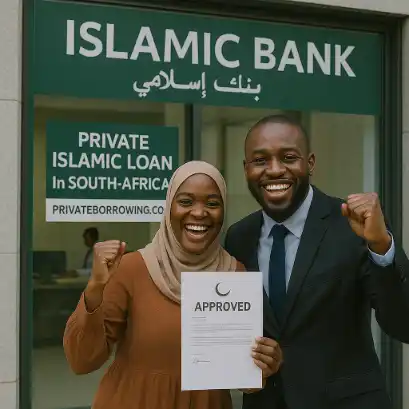
What is an Islamic Private Loans in South Africa?
In South Africa, halal private funding is used for personal needs, business growth, property purchases, or even microfinance. The key feature is that they are always linked to real assets or services and are based on fairness, transparency, and shared responsibility between lender and borrower.
Private Islamic Loan in South Africa — Full Definition, Types & How It Works
A private Islamic loan in South Africa is financing offered on a Shari’ah-compliant basis by banks with Islamic windows and licensed finance providers. Instead of charging interest (riba), Islamic finance structures use trade, leasing or partnership contracts with transparent profit and asset-backed risk-sharing. A Shari’ah Supervisory Board or certified scholars review and approve product structures and documentation to ensure compliance.
Common Islamic finance structures in SA
- Murabaha (cost-plus sale): the financier purchases an asset and sells it to you at cost plus an agreed profit, repaid in instalments.
- Ijara (lease): the financier buys the asset and leases it to you; rentals may include a purchase option at term end.
- Diminishing Musharaka (home finance/partnership): you and the financier co-own the property; you gradually buy the financier’s share while paying use-rent.
- Qard Hasan (benevolent loan): zero-profit social lending; typically limited and offered by charities/communities rather than commercial banks.
How pricing works (no interest)
Instalments reflect a profit rate linked to the chosen structure (e.g., Murabaha selling price schedule or Ijara rentals). Fees and profit must be disclosed upfront. Early settlement, late-payment charity policies and ownership/title flows are defined in the contract pack.
Do & Don’t when applying
- Do ask for the Shari’ah certificate/approval or policy summary and confirm the contract type (Murabaha/Ijara/Musharaka).
- Do compare the total payable and not only the monthly instalment; check early-settlement and late-payment charity clauses.
- Do verify the institution is licensed in South Africa and that products are offered locally.
- Don’t assume “Islamic” equals cheaper—pricing is still risk-based and subject to affordability and credit checks.
- Don’t accept vague “Islamic-style” offers without written contracts and Shari’ah governance.
Typical documentation
- SA ID/passport, proof of address (≤ 3 months)
- Income verification: payslips and ±3 months’ bank statements (more for self-employed: financials/tax)
- Asset/quotation documents (for Murabaha/Ijara) or property details (for Musharaka/home)
- Consent to credit checks; additional KYC per lender policy
If you miss payments
- Arrears reminders and collection per contract; late-payment amounts are typically directed to charity, not treated as profit.
- For secured assets, repossession/transfer clauses may apply. Defaults are reported to credit bureaus under South African law.
Keywords: Islamic finance South Africa, Murabaha, Ijara, Diminishing Musharaka, halal personal loan, Shari’ah-compliant banks SA, Islamic microfinance/CFI.